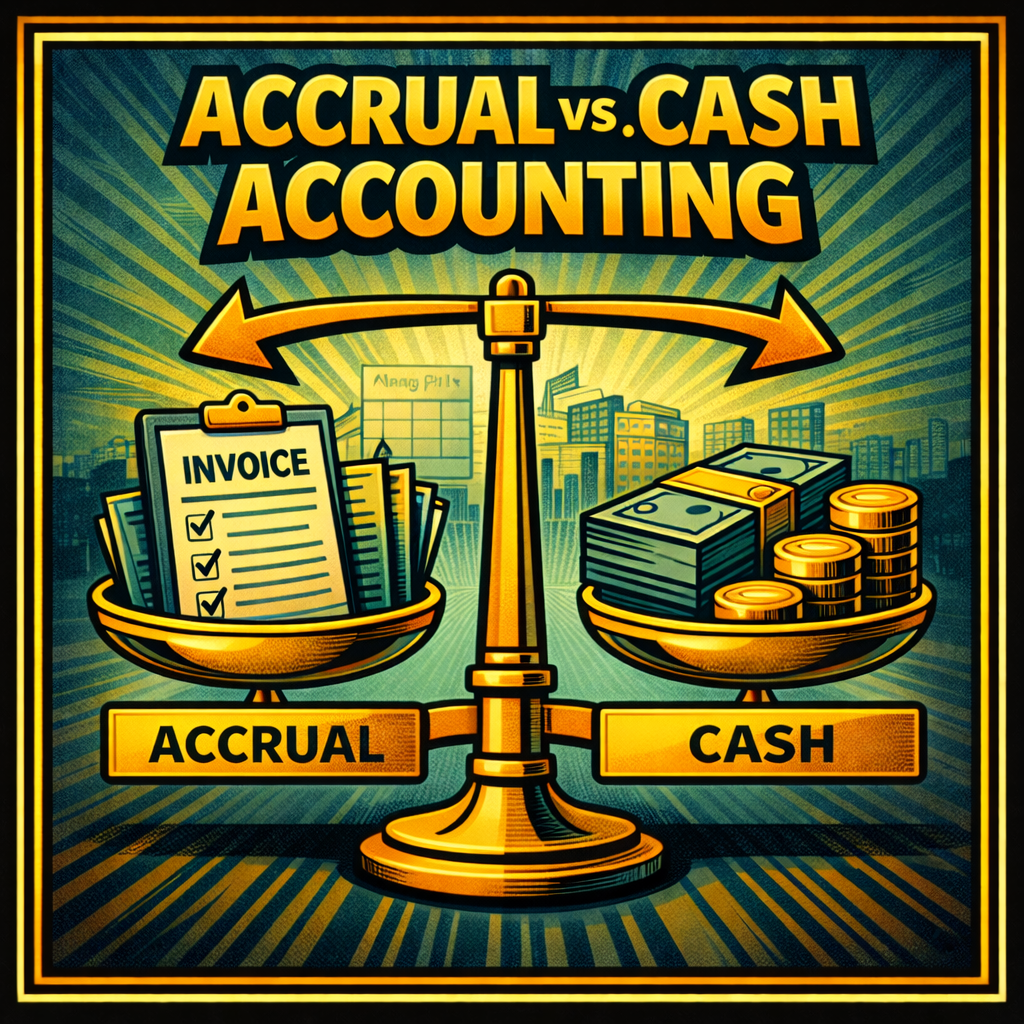
Accrual vs. Cash Accounting
“Cash counts the wallet. Accrual counts the moves.”
Accrual vs. Cash Accounting: Which Method Tells The Real Story?
When it comes to understanding a company’s financial performance, one of the most important decisions made is how to track income and expenses. The two primary methods—Cash Accounting and Accrual Accounting—can paint very different pictures of a business, especially when it comes to profitability, taxes, and cash flow.
What’s the Difference?
Cash Accounting records income when cash is received and expenses when cash is paid.
Accrual Accounting records income when it’s earned and expenses when they’re incurred, regardless of when money changes hands.
A rule-of-thumb, of sorts, goes: “If it hits the bank, it’s cash. If it hits the books, it’s accrual.”
📊 Quick Comparison
| Category | Cash Accounting | Accrual Accounting |
|---|---|---|
| Revenue Recorded | When payment is received | When product/service is delivered |
| Expenses Recorded | When bills are paid | When bills are incurred (even if unpaid) |
| Simplicity | Easier to manage | Requires more detailed tracking |
| Financial Accuracy | May distort profitability | Provides full-picture financial performance |
| Used By | Freelancers, smaller businesses | Larger businesses, lenders, GAAP-compliant companies |
In Short, the focus of Cash Acctg. is actual cash in/out, while the focus of Accrual Acctg. is economic activity over time.
Simple Example 1
Scenario | Cash Accounting | Accrual Accounting |
Invoice sent for $10,000 job | Not recorded until paid | Revenue recorded immediately |
Supplier invoice received | Not recorded until paid | Expense recorded when received |
Simple Example 2
Let’s say you deliver a $25,000 project in December but don’t get paid until January (a period spanning two tax periods).
- Cash Accounting: You record the revenue in January when you receive payment.
- Accrual Accounting: You record the revenue in December, when the work was completed.
Same project, different story — and it could affect your tax bill, your profit report, and your ability to borrow money.
Real-World Example: Commercial HVAC Installation Project
Scenario:
A commercial HVAC company completes a $200,000 system installation for a client in October. The contract allows the client to pay in four monthly installments starting in November.
Cash Accounting:
Revenue is recorded as each payment is received — likely split across November, December, January, and February.
Result: The business appears to generate revenue over several months, even though the work was completed in October.
Accrual Accounting:
The entire $200,000 is recognized as revenue in October, when the installation is finished and invoiced.
Result: Revenue (and profit) is tied to the period in which the work was performed, not when cash hits the account.
Why it matters: This affects tax timing, performance evaluations, and cash flow projections — especially if a loan is being underwritten using EBITDA or profit margins.
Real-World Example: Annual Software License Sale with Deferred Delivery
Scenario:
A SaaS (Software as a Service) company signs a $120,000 annual contract in January, but the software platform won’t be fully implemented until March.
Cash Accounting:
If the client pays in full upfront, the entire $120,000 is recorded as income in January.
Result: January looks highly profitable, even though the service hasn’t been delivered yet.
Accrual Accounting:
Revenue is spread monthly starting in March, when the service begins – $10,000 a month through the 12-mo. contract term.
Result: Income is aligned with when the value is actually delivered, improving accuracy in forecasting and reporting.
Why it matters: Revenue recognition affects compliance, investor reporting, and how lenders evaluate recurring income — particularly for SaaS and service businesses.
Cash Accounting
- Best For: Small businesses, sole proprietors, service-based companies without inventory.
- Pros:
✅ Simple to manage
✅ Easy tax tracking
✅ Real-time cash clarity - Cons:
❌ Doesn’t show accounts receivable/payable
❌ May misrepresent profitability
Accrual Accounting
- Best For: Growing businesses, those with inventory, employees, or credit terms.
- Pros:
✅ Matches revenue with the expenses it took to earn it (matching principle)
✅ Gives a complete picture of financial performance
✅ Required for GAAP compliance, most audited financials and many loan applications - Cons:
❌ More complex and requires consistent recordkeeping
❌ Can be misleading on cash flow without context
🏦 Why Bankers and Lenders Prefer Accrual
When a lender evaluates your business, they want to know:
- What have you earned?
- What do you owe?
- What obligations are coming down the pipeline?
Accrual accounting answers these questions more clearly. It presents a complete financial picture, including outstanding invoices, future obligations, and the timing of revenue recognition — making it the standard for financial analysis and underwriting.
Cash-based statements can miss liabilities, such as unpaid bills or earned revenue not yet collected — making the business look healthier (or worse) than it really is. That said, lenders can, and often do, adjust financials from cash to accrual during underwriting.

Key Takeaways
- Cash accounting tracks cash in hand — great for simplicity and short-term management.
- Accrual accounting tracks economic activity — essential for decision-making, taxes, and financial partnerships.
- As your business grows, accrual becomes more important for financial transparency, tax compliance, and credibility with investors and banks.
💬 Final Word
Choosing between accrual and cash isn’t just about bookkeeping — it’s about how you view and manage your business.
Cash accounting is great for keeping things simple. Accrual accounting helps you think like a CEO.
💡 Bonus: IRS & Regulatory Notes
- Businesses with gross receipts over $25 million (3-year avg.) must use accrual for tax reporting (per IRS Section 448).
- Inventory-based businesses (use inventory to calculate cost of goods sold (COGS) are frequently required to use accrual for purchases/sales tracking. Discuss with your CPA.
- GAAP (Generally Accepted Accounting Principles) mandates accrual accounting for all audited financial statements.

